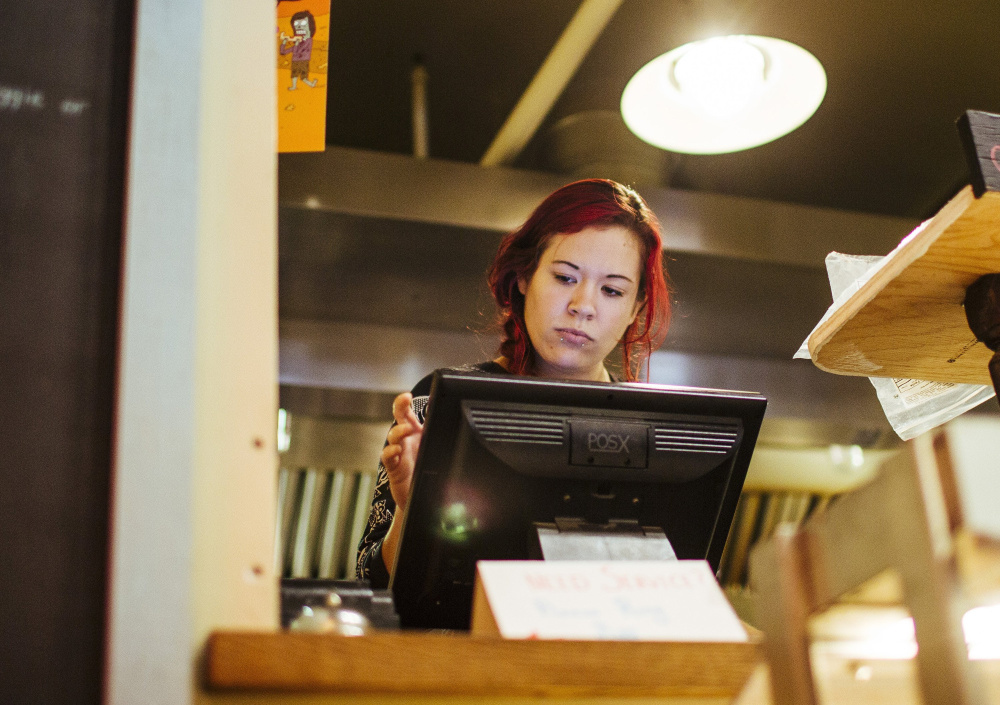The buying power of low-wage workers has decreased tremendously in the last few decades, even as their productivity and education level has grown. They are long overdue for a raise, and a solid majority of Americans agree.
Yet in Maine the minimum wage has not changed since 2009, as increases of various size have failed in the Legislature, despite public support.
In response to that inaction, proponents of a reasonable minimum-wage increase collected more than 75,000 signatures to put a question on the November statewide ballot. Now, a coalition of organizations that have in the past opposed any increase want legislators to place on the ballot a competing question that would offer a smaller boost in pay. Adding a second measure would muddy what should be a simple question for Maine voters, and it should be dismissed.
FAILURE TO ACT
The question already on the ballot, shepherded by the progressive Maine People’s Alliance, would raise the minimum wage from $7.50 to $9 in 2017, then $1 every year until it hits $12 in 2020 – closer to $11 an hour in today’s money – when it would be indexed to inflation.
The proposal would also raise the tipped minimum wage earned by restaurant servers from $3.75 to $5 in 2017, then increase it each year until it is equal to the full minimum wage.
That is similar to one of the minimum-wage bills considered by the Legislature last year. All told in 2015, there were seven proposals to raise the wage, ranging from a one-time, immediate 50-cent-per-hour increase to a gradual, $4.50-an-hour raise.
All of the proposals failed to gain traction with lawmakers, in large part because all were opposed by some of the state’s most well-known and influential business groups, including the Maine Restaurant Association and the Retail Association of Maine, among others.
As a result, and despite widespread support for a raise from Maine residents, no statewide minimum-wage increase was approved in 2015.
Now, those groups suddenly are all for an increase, as long as it is smaller than the one presented in the citizen-initiated proposal.
The plan from the business coalition would boost the minimum wage to $8.50 an hour in 2017, then raise it by 50 cents each year until it hits $10 an hour in 2020, when the increase would stop. The wage would not be tied to inflation.
The coalition released the plan last week, saying it is an alternative to the “extreme wage” now on the ballot, and asked the Legislature to place it before voters in November as a “competing measure,” allowed under the Maine Constitution.
After saying for so long that a base-pay increase would be unaffordable for businesses, members of the coalition have apparently realized that the $12-an-hour initiative is likely to resonate with voters who have seen lawmakers repeatedly avoid the issue. But the coalition is backing a proposal that does not even make up for the years of inaction.
HELP FOR BREADWINNERS
The citizen-initiated increase already on the ballot, however, comes close.
The minimum wage hit the peak of its value in 1968, when it was worth $9.54 in today’s money, 36 percent higher than today’s federal minimum wage.
Even at that level, though, low-wage workers would be left behind their peers, in a historical sense – the minimum wage would still be far lower as a percentage of the overall median wage as well as of the median wage for non-supervisory production workers.
And low-wage workers today now are older, more productive and have higher levels of education than 50 years ago. They are more likely to support a child and to be a family’s main breadwinner.
They are, more and more, adults working full-time who are being paid historically low wages not because that is what businesses can afford, but because that is what the law says workers can be paid, and the law hasn’t kept up with time.
And the warnings of business closures and job losses accompanying a wage increase? So far, they have not materialized. Six months after the minimum wage in Seattle jumped to $11 an hour – on its way to $15 – the restaurant industry has continued to boom, despite dire predictions.
Elsewhere, increases have been shown to have little effect on employment, and only a modest upward effect on prices. Also, an increase would lessen the burden on social programs that support workers who make poverty-level wages.
In any case, there will be time for those arguments, and their counters, during the run-up to the November vote. At that time, there will be a robust debate over the merits of a minimum-wage increase, and it shouldn’t be confused by a half-hearted proposal from organizations that would rather see no increase at all.
Send questions/comments to the editors.



Success. Please wait for the page to reload. If the page does not reload within 5 seconds, please refresh the page.
Enter your email and password to access comments.
Hi, to comment on stories you must . This profile is in addition to your subscription and website login.
Already have a commenting profile? .
Invalid username/password.
Please check your email to confirm and complete your registration.
Only subscribers are eligible to post comments. Please subscribe or login first for digital access. Here’s why.
Use the form below to reset your password. When you've submitted your account email, we will send an email with a reset code.